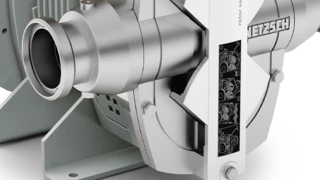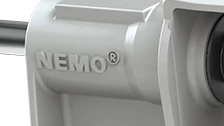NETZSCHicon
Pump Efficiency
Pump efficiency measures how efficiently a pump converts energy into mechanical work to move liquids or gases. It expresses the ratio between the work done by the pump (pressure increase and flow) and the energy supplied.
Pump efficiency is defined as a percentage. Mathematically speaking, pump efficiency means:
Pump efficiency (%) = (power of the pump/input power) * 100.
The “power of the pump” refers to the pump's work, such as raising the pressure and pumping the medium. The “input power” is the amount of energy supplied to the pump to do this work. This can be the electrical power that drives the pump. A higher pump efficiency indicates that the pump works more efficiently and wastes less energy. A lower pump efficiency means the pump needs more energy to do the same work, resulting in higher operating costs.





